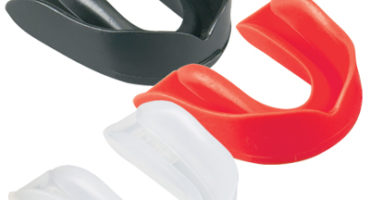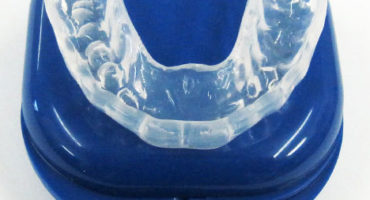Wearing a custom-fitted mouth guard can help to absorb the impact of a blow to your face, which could cause injury to your mouth or jaw.Injuries to teeth can result in time off work or school and can be painful and disfiguring. Treatment can involve several lengthy appointments presuming it is even possible to save the tooth. The cost of an injury to your teeth or jaw far exceeds the cost of a custom-fitted mouth guard.
Mouth guards should be worn while playing and training for any sport where there is a possibility of contact to the face. These sports can include hockey, baseball, football, basketball and even skateboarding, snowboarding & skiing.
Mouth guards help protect you in the following ways:
- They protect your teeth from accidental blows to the head from elbows, knees, sporting equipment, heads etc..
- They stop your teeth from being pushed into one and other and causing further damage.
- They help to protect your lips from cuts and punctures by shielding them from your teeth.
- They can help lower the risk of concussion by creating a buffer between your head and chin along with reducing the risk of possible jaw fractures.
Our mouth guards are custom made to the exact shape of your mouth, ensuring you are able to breathe & communicate effectively. Whether you’re playing sport for the first time or are a professional athlete, ensure you protect your teeth with a mouth guard from Borbely Swiss Denture Clinic! Also see the other services we offer.
FAQ
Can I sleep with a sports mouthguard? No. There are mouthguards specifically designed for nighttime use – these mouthguards help prevent bruxism, commonly known as teeth grinding. Sports guards, on the other hand, are designed to lessen the impact of external blows to the mouth and stop patients from damaging soft tissue and teeth. They share some similarities, but mouthguards and sports guards are quite different!
How long do sports mouthguards last? That depends on a number of factors, including the type of sport you’re playing and how often you play every season. Generally, sports guards will last two to three seasons. Of course, the more impacts your sports guard absorbs, the shorter its lifespan might be!
Do sports mouthguards protect bottom teeth? They do! Even though sports mouthguards are only placed on the upper teeth, they protect both the upper and lower teeth. That’s because they can absorb the shock of your lower teeth moving towards your upper teeth – and they help protect your soft tissues, too.
There’s one exception to this rule. Players who wear braces should get a sports mouthguard that covers both their upper and lower teeth, as the braces on your lower teeth can cause some serious damage to the soft tissue of your teeth and gums after an impact.
Can sports mouthguards cause cavities? A sports mouthguard shouldn’t significantly increase your risk of cavities, especially if you clean the guard properly and don’t wear it too often. Night guards are a bigger risk factor since patients will leave them in for 8 hours or more at a time. Nonetheless, it’s a good idea to clean your sports guard thoroughly after each use and stay diligent about your oral health routine!



